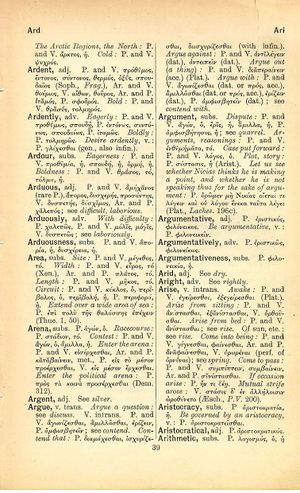arise: Difference between revisions
From LSJ
λέγεις, ἃ δὲ λέγεις ἕνεκα τοῦ λαβεῖν λέγεις → you speak, but you say what you say for the sake of gain (Menander, fr. 776)
(Woodhouse 2) |
(CSV3) |
||
| Line 1: | Line 1: | ||
{{ | {{Woodhouse1 | ||
| | |Text=[[File:woodhouse_39.jpg|thumb|link={{filepath:woodhouse_39.jpg}}]]'''v. intrans.''' | ||
<b class="b2">Awake</b>: P. and V. ἐγείρεσθαι, ἐξεγείρεσθαι (Plat.). | |||
<b class="b2">Arise from sitting</b>: P. and V. ἀνίστασθαι, ἐξανίστασθαι, V. ὀρθοῦσθαι. | |||
<b class="b2">Arise from bed</b>: P. and V. ἀνίστασθαι; see [[rise]]. (Of sun), etc.: see [[rise]]. | |||
<b class="b2">Come into being</b>: P. and V. [[γίγνομαι|γίγνεσθαι]], [[φαίνω|φαίνεσθαι]], Ar. and P. ἀναφαίνεσθαι, V. ὀρωρέναι (perf. of ὀρνύναι); see [[spring]]. | |||
<b class="b2">Come to pass</b>: P. and V. συμπίπτειν, συμβαίνειν, Ar. and P. συνίστασθαι. | |||
<b class="b2">If occasion arise</b>: P. ἤν τι δέῃ. | |||
<b class="b2">Mutual strife arose</b>: V. [[στάσις]] δʼ ἐν ἀλλήλοισιν ὠροθύνετο (Aesch., ''P.V.'' 200). | |||
}} | }} | ||
Revision as of 09:20, 21 July 2017
English > Greek (Woodhouse)
v. intrans.
Awake: P. and V. ἐγείρεσθαι, ἐξεγείρεσθαι (Plat.).
Arise from sitting: P. and V. ἀνίστασθαι, ἐξανίστασθαι, V. ὀρθοῦσθαι.
Arise from bed: P. and V. ἀνίστασθαι; see rise. (Of sun), etc.: see rise.
Come into being: P. and V. γίγνεσθαι, φαίνεσθαι, Ar. and P. ἀναφαίνεσθαι, V. ὀρωρέναι (perf. of ὀρνύναι); see spring.
Come to pass: P. and V. συμπίπτειν, συμβαίνειν, Ar. and P. συνίστασθαι.
If occasion arise: P. ἤν τι δέῃ.
Mutual strife arose: V. στάσις δʼ ἐν ἀλλήλοισιν ὠροθύνετο (Aesch., P.V. 200).

